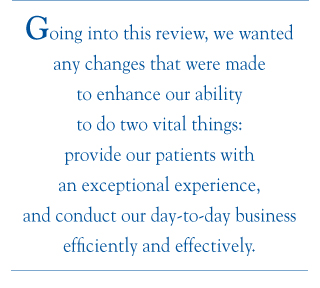UMMC Leadership 2.0
Good morning!
Today I want to talk about our plans for some adjustments to our organizational structure that will make us more efficient, effective and patient-focused.
A few months ago, we brought in a firm that has extensive experience advising academic medical centers on how best to organize to achieve their missions.
This is not an insignificant question. There's an old saying, offered in jest, that "If you've seen one academic medical center, you've seen one academic medical center." Although AMCs have some features in common, it's fair to say that no two are exactly alike. So there are many options, and very little agreement, as to how they ought to be organized.
 Beyond that basic fact, there are several reasons why now is a good time to step back and take a look at our structure. I am new in my role as vice chancellor, and we will soon have a new chancellor of the University of Mississippi. With these changes in leadership on both campuses, there's a feeling that we are starting a new chapter in the story of UMMC.
Beyond that basic fact, there are several reasons why now is a good time to step back and take a look at our structure. I am new in my role as vice chancellor, and we will soon have a new chancellor of the University of Mississippi. With these changes in leadership on both campuses, there's a feeling that we are starting a new chapter in the story of UMMC.
Even more important, the Medical Center has experienced dramatic growth during the last 10 to 15 years. We've added many roles, functions and systems that have changed the way we do business. Although we've tried to be thoughtful about how we've structured this growth, the passage of time provides perspective about better ways to do things.
We've also had a tradition of centralized management that is reflected in our current organizational structure. That management style worked for past leaders, and it made perfect sense in an era when UMMC and its leadership group were much smaller.
Today, the number of people reporting directly to the vice chancellor is approaching 50. Even under the best of circumstances, that can create a bottleneck that slows decision-making, hinders communication and limits time available for other priorities.
Going into this review, we wanted any changes that were made to enhance our ability to do two vital things: provide our patients with an exceptional experience, and conduct our day-to-day business efficiently and effectively.
Our work with the consulting firm was thoughtful, thorough and inclusive. As part of the engagement, the firm interviewed 68 leaders from throughout the organization.
With that preamble, here are the highlights of the changes we are adopting, which I am calling UMMC Leadership 2.0:
- We recently created a chief operations officer role to help us refine, or in some cases, reengineer our business processes. The COO will also assume operational responsibility for Contracts Management, Strategic Planning and Human Resources. Compliance will continue to report to the vice chancellor but will work with the COO on operational efficiencies. Reatha Clark, who has extensive experience with business process engineering, joined us in the COO role July 1.
- The COO will also be responsible for a new project management function, which will provide analysis, coordination and support for all business initiatives either under consideration or under way. This capability is something we have sorely needed.
- Several of our institutional advancement offices - Development, Economic Development, Marketing, and Public Affairs - are being grouped under the direction of my chief of staff, Dr. Brian Rutledge. Government Affairs will report to Dr. Claude Brunson, senior advisor for external affairs.
- The role of vice dean for medical education, held by Dr. Loretta Jackson-Williams, is being expanded to play a larger part in management of School of Medicine operations. She will collaborate with Associate Vice Chancellor for Research Dr. Richard Summers and Associate Vice Chancellor for Clinical Affairs Dr. Charles O'Mara as the primary point of engagement in the their respective areas for the School of Medicine chairs, who will continue to report to me as dean.
- We are creating a new committee structure to oversee and coordinate activities of the clinical enterprise. A Health System Council will link to existing and new institutional committees, including an overarching UMMC Leadership Council.
- Finally, we are creating a Health System CEO role to jointly lead our fully integrated clinical enterprise in partnership with Dr. O'Mara. I've asked Kevin Cook, CEO of the adult hospitals, to assume this role effective Sept. 1. This partnership model between a physician and an administrator - sometimes called a dyad - will gradually be replicated in other parts of the clinical enterprise. We believe this model is key to aligning our operational and clinical activities around the interest of the patient.
As you can see, these changes are not earth-shattering. If UMMC was an automobile, they'd represent more of a tune-up than an overhaul. But they do home in on certain areas where we feel we have the most critical needs.
(And by the way, our new organization charts reflecting these changes are under development and will be posted on our website in the next few weeks. We'll be sure to give you a heads-up.)
When I reviewed these plans with our senior leaders yesterday, I was able to say that in my 20 years in administrative roles at UMMC, I believe our leadership team has never been stronger. And I believe the main reason these changes are so important is they enable our wonderful leaders, and by extension all of our caring employees, to be more fully engaged and empowered in the service of our patients and our students. That's why we're here, and that's how we'll get to A Healthier Mississippi.



